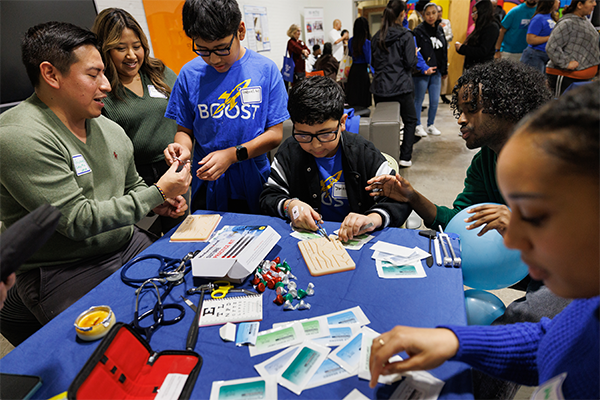Zhang Awarded 2024 Sontag Foundation Distinguished Scientist Award
Zhao Zhang, PhD , associate professor of pharmacology and cancer biology, has been named a recipient of the 2024 Distinguished Scientist Award from The Sontag Foundation.
Spotlight on Omar Mohiuddin, OTR/L, MS, MPH, CLVT
Over the years as an occupational therapist, Omar Mohiuddin, OTR/L, MS, MPH, CLVT, came to realize that many accessibility issues often go unaddressed, even in spaces originally designed with older adults and persons with visual impairment in mind. That realization fueled his passion for accessibility and drives his devotion to improving the day-to-day lives of persons with blindness and low vision.
A Weekend of Reunion and Celebration: 2024 Duke Medical Alumni Weekend Video
Hundreds of medical alumni and their guests returned to Duke, Nov. 14 - 17, 2024, to celebrate the annual Duke Medical Alumni Weekend festivities. This year, packed full of reunion programming, featured a special nod to Duke's Centennial celebration.
Celebrating a 20-Year Legacy of Boosting Student Interest in STEM
Duke University School of Medicine’s BOOST Program recently celebrated 20 years of inspiring young people to pursue careers in science, technology, engineering, and medicine (STEM).
Randall's Journey
In 2017, JaNiece and Randy Saladin were devastated to learn that their 8-month-old-son, Randall, had a brain tumor. Today, Randall is thriving thanks to support from the Duke Pediatric Neuro-oncology Program team and a breakthrough FDA-approved drug.
Study Reveals Short Term Safety of Active Monitoring for 'Stage 0 Breast Cancer'
The first study comparing surgery to active monitoring as treatment for ductal carcinoma in situ (DCIS) finds women who carefully monitor the precancerous cells are no more likely to develop breast cancer after two years than women who undergo surgery to remove them.
Historic Gift Will Bring Proton Therapy to Duke
An historic $50 million gift from an anonymous donor will bring proton therapy to Duke. Proton therapy is more precise than conventional x-ray radiation and will greatly enhance Duke's ability to improve patient outcomes. The gift is the largest philanthropic gift ever received by the health system.
First, a Library: Celebrating Duke University Medical Center Library
The Duke University Medical Center Library began in 1927 with a bold vision from founding dean Wilburt Davison, MD, who prioritized a library even before hiring faculty. Today, it’s a dynamic hub supporting students and faculty with cutting-edge resources and partnerships, from systematic literature reviews to advancing health equity.
Root Causes Food Program Seeks Room to Grow
On Saturday mornings, a group of Duke University School of Medicine students who are in training to one day treat cancer or perform surgery gather to ensure that those in the Durham County community have enough nutritious food to eat. The Fresh Produce Program, part of Root Causes , a medical student organization striving to address social drivers of health, delivers food twice a month to families living in a county where 1 in 10 people face food insecurity.
Duke AHEC: 50 Years of Workforce Development in Behavioral Health & Beyond
The North Carolina Area Health Education Centers (NC AHEC) program was established in 1974 to address concerns with the supply, distribution, and retention of health care professionals. Duke AHEC, one of nine regional AHEC programs throughout the state, has been led by Duke Psychiatry's Marvin Swartz, MD, since 1996 and delivers programs and services primarily in the Fayetteville area.









